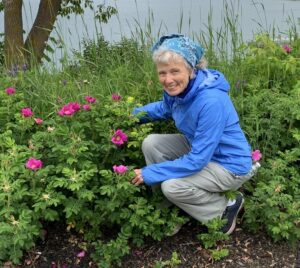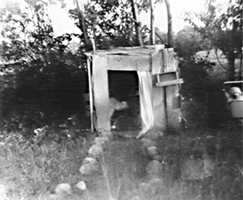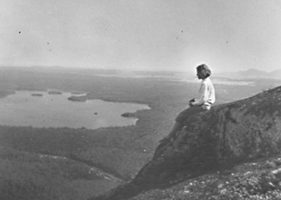ABOUT ELLEN

Ellen Bryan Obed is the author of nine books for children. Poetry, prose, fantasy and science, her books revel in nature and the northern seasons. They have received several awards including two Canadian Children’s Book Center, Our Choice Awards, the Maine Chapbook Award, and A Junior Library Guild Selection. One of her books, Borrowed Black, has been translated into seven languages, appeared in thirteen different editions, and has been produced for the stage by five different theatre companies since it was first published in 1979.
Where were you born and where did you grow up?
I was born in Orange, New Jersey, during World War, II, when my dad was in the Coast Guard, serving in the South Pacific. When the war was over and I was thirteen months old, my dad took our family to Waterville, Maine. This is where I grew up.
What experiences in your childhood influenced your writing?

Our home was an old farmhouse and barn surrounded by six acres of fields, gardens, orchards, and hedgerows. Two of my three brothers (my youngest brother was not born until I was sixteen years old), my sister, and I played in the hedgerows and orchard all summer long. We built little houses called ‘hide-outs’ in the hedgerows. We made them out of scrap lumber we found in the barn. We called our town ‘Grassy Hills.’
These times of play nurtured my imagination.
Our dad loved to be outside so almost everything we did was out-of-doors. In summer, we went hiking, canoeing, and fishing. We played family baseball games in the backfield. We helped our dad plant the gardens and harvest apples in the orchard. In winter, we went skating and ice fishing on nearby ponds. We built a skating rink on the garden. We went sledding down the little hill behind the barn.
These outdoor experiences gave me a love of nature and the seasons.
Our mother loved music. She was always singing. She sang lively action songs and quiet lullabies to us when we were small. She sang the poetry of Robert Louis Stevenson from A Child’s Garden of Verses. She sang songs from Gilbert and Sullivan operettas and Rodgers and Hammerstein musicals.
Her singing gave me a love for the sound of language—its cadence, its voice.
But it was my maternal grandmother who most greatly influenced my writing. When we went for walks together, she quoted poetry—A.A. Milne, R.L. Stevenson, Longfellow, and Tennyson. And when I started to write poetry of my own, she gave me a little hard-bound blank book called a “Scribble-in Book.” I would take my Scribble-in Book into the orchard. I made a platform in the big crabapple tree where I could sit and write in secret. I also wrote under a favorite apple tree. Little warblers would flit on the branches a few inches from my face!
My grandmother also gave me a love for wildflowers. She gave me a wildflower book when I was ten years old. I took it with me wherever I went. “Please stop the car,” I’d ask my dad when we were driving along a country road. “I just saw a flower. I want to know what it is!” When the little book got tattered and the binding fell apart, I stitched it up with green thread. I kept a notebook of the names of the wildflowers I saw each year and the date I first saw them. My dad would call me ‘Bot’ for botany because I loved plants so much.
And my grandmother gave me a love for the piano. We didn’t have a piano in our house when I was young, so I would pull out a drawer of a large bureau and pretend to play. Whenever I went to my grandparents’ house, I would sit at their piano and try to play. When I was eleven years old, my parents bought a piano and I started lessons. From then on, if I wasn’t writing poetry or studying plants, I was playing the piano.
What did you want to be when you grew up?
What were your favorite books when you were growing up?
The Giant Golden Book of Elves and Fairies selected by Jane Werner.
This collection of fanciful stories and poems about little people (and not-so-little) kindled my imagination.
POETRY BOOKS
For birthdays and Christmases, I always received books of poetry. My first poetry books were A Child’s Garden of Verses by Robert Louis Stevenson and When We Were Very Young by A.A. Milne. By the time I was a teenager, I had a bookcase full of poetry books. My favorites were the poems of Walter de la Mare, Robert Frost, and Edna St. Vincent Millay, anthologies, and a collection of sonnets. But Millay was my kindred spirit. She had a passion for poetry and nature. As a child, she also had dreams of becoming a poet. When I was in high school, I composed a sonnet, “To Edna St. Vincent Millay,” in her honor.
When did you start writing?
What did you do when you grew up?
When I finished high school, I went off to college to study botany and music. After my second year, when I was twenty years old, I went to Labrador for the summer. I worked as a camp counselor in a small town on the coast. This changed my life. I returned the next summer and the next and the next. I loved the people, the landscape, the wildflowers and berries of Labrador.
In 1969, when I finished college, I returned to Labrador to teach school and to study its flora. In 1973, I married a man from northern Labrador. We had three children. I lived in Canada sixteen years, ten of which were in Labrador. In 1988, my three children and I moved to Old Town, Maine, where I worked as a piano teacher, organist, and writer for fifteen years.
Where do you live now?
Where do you get your ideas?

Nature and the northern seasons inspire me. The sun, sleeping like a red fox on the side of day. The red-breast sky with its cloud-feathered back. The island, a green ship waiting for someone to pull its anchor up. The porcupine hill. The cookie moon. And writer rain.
I enjoy researching a natural history subject and finding a voice for it. And when I write fantasy, I ground it in a northern place. Maine and Labrador are the settings for most of my work. Other ideas come from my experiences as a child (e.g. Twelve Kinds of Ice) and the experiences of my children and grandchildren (e.g. A Letter from the Snow).
But underneath all my writing is the knowledge that everything I create comes from God. Whatever I write is giving back to Him what he has given to me. I must continually remind myself of what King David prayed in the Old Testament, “All things come of thee and of thine own have we given thee.” (I Chronicles 29:14b)
What do you like to write best?
Poetry is the genre that comes most naturally to me. Writing a poem is like carving. I carve the lines until they say what my poem wants to say. Writing sonnets in high school helped me to develop the discipline of word choice. Reading Emily Dickinson helped me to see that if I could say something in ten words, I didn’t need fifty. I kept the following anonymous poem in the inside cover of my writing journal.
should be clean as bone,
clear as light
firm as stone.
Two words are not
as good as one.
When I write a poem, I let the subject dictate whether I will use rhyme or free verse. Neither rhyming nor free verse in itself makes a poem good or bad. How the rhyming or the free verse is employed is what makes the difference!
Here are two examples from my poetry.
Free Verse
Writer Rain
The poem descends the page with a quiet cadence to give the sound, the sight, the feel of summer rain.
is telling
her stories
on the
green pages
of forest leaves
and
on the
dark sheets
of cabin roof.
She
is writing
with silver
ink
that pours
out
all day
from
the
gray-bottled
clouds.
Rhyme
Grass Song
The poem is intensely rhythmic, repetitive, and rhyming, giving the poem momentum. The reader skips along with the lines, naming different kinds of grass. Can you identify the twelve different kinds (species) of grass in the poem?
Students in a primary grade class in Amherst, Nova Scotia, once performed Grass Song for me. They danced the poem as they recited the lines in rap-like rhythm.
Witchgrass, Switchgrass, in-the-roadside-ditch grass;
Junegrass, strewn grass, waving-on-the-dune grass;
Everywhere I pass, grass. Everywhere I see
Bluegrass, new grass, wet-with-morning-dew grass;
Stiff grass, sniff grass, growing-on-the-cliff grass;
Everywhere I pass, grass. Everywhere I see
Foxtail, Squirreltail, standing-brown-and-stale grass;
Barley, Timothy, tickles-on-the-knee grass;
Everywhere I pass, grass. Everywhere I see
Sweet Grass, peat grass, soft-beneath-my-feet grass;
Clump grass, stump grass, even-in-the-dump grass;
Shy grass, high grass, almost-to-the-sky grass!
Everywhere I pass, grass – and grasses pass me!
Like our lives, poems often have many layers. Sometimes I do not know the layers in a poem until I have finished writing it. This is what happened with Sky Carver. I wrote the poem when I was living in Nain, Labrador. I was telling how spring comes to the north. I was comparing the process to carving because there are so many excellent carvers among the Inuit in the north. Afterwards, I saw that there was one more layer. The poem also speaks of how I work as a writer!
Gently the sun
with steady eye
whittled at winter from the sky.
Deeper she cut
with sharpened ray
as pieces of winter
fell away.
Warmly she held
it up when done,
“This is my carving called Spring,”
said the sun.
